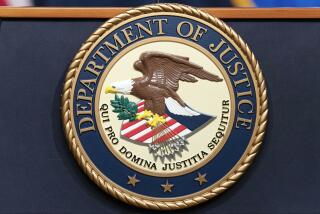Pakistani Man Aided Al Qaeda, U.S. Charges
WASHINGTON — U.S. authorities Friday charged a Pakistani man already in federal custody with conspiring to help Al Qaeda, alleging that he agreed to try to help an operative of the terrorist network get into the country illegally and obtain immigrant status.
Sources close to the investigation said authorities believed that Uzair Paracha may have been part of a plot overseen by Al Qaeda mastermind Khalid Shaikh Mohammed to launch a chemical attack somewhere in the United States. Paracha was charged with conspiring to provide unspecified material support and resources to Al Qaeda.
If convicted, Paracha, 23, faces a maximum of 15 years in prison and $250,000 in fines.
Paracha, who has permanent resident status in the United States, has been in federal custody since his secret arrest in New York in late March. He is classified as a material witness.
U.S. officials and Paracha’s defense lawyer said Friday that Mohammed, after his March 1 arrest in Pakistan, provided his interrogators with information that led to the arrest of Paracha and the charges filed against him.
The complaint issued Friday alleges that Paracha met with a known Al Qaeda operative in Pakistan and agreed to help that operative obtain documents to enter the United States.
In return, the operative and his Al Qaeda associates would invest $200,000 that Paracha believed to be “Al Qaeda money” in a Pakistan business for which Paracha worked, according to the complaint.
“Paracha believed that if Paracha did not perform the tasks that [the Al Qaeda associates were] requesting him to undertake in the United States, then [the associates] might not invest money in the business,” the complaint said. “Paracha knew that, by performing tasks that [the Al Qaeda associates] had asked of him, Paracha would be acting on behalf of Al Qaeda.”
Sources close to the investigation said Mohammed, Al Qaeda’s chief of operations, was personally involved in the discussions with Paracha. The FBI and other U.S. officials said they could not comment on the details of the complaint.
In a statement, Atty. Gen. John Ashcroft said the case “demonstrates that Al Qaeda will go to great lengths to enlist support here in the United States. Our efforts are focused on identifying and dismantling those rings of support on which our terrorist enemies seek to rely.”
According to the complaint, Paracha was living in Pakistan earlier this year when he met a man he believed to be an Al Qaeda operative.
When the operative learned that Paracha planned to travel to the United States, he asked Paracha to pose as him here, deposit money into his Maryland bank account, use his credit card, close his post office box in Maryland and obtain immigration documents he had already applied for, the complaint alleges.
The operative, who was not identified in the complaint, remained in Pakistan and didn’t intend to travel to the U.S. until he received the immigration documents obtained by Paracha. The idea was that the operative would then be able to “reenter” the United States with less scrutiny because a man with his identity would already have come and gone.
Paracha made a court appearance in Manhattan on Friday as more than a dozen family members watched. He told the judge that he understood his rights and had read the indictment.
Defense lawyer Anthony Ricco said Paracha intended to plead not guilty, and that his actions appeared more sinister than they were.
“He’s a very bright young man who has been caught up in a confluence of events that are way over his head,” Ricco said. “Like many young people, he was susceptible to being manipulated and was manipulated” by sophisticated Al Qaeda operatives.
A bail hearing has been scheduled for Tuesday. Ricco said that he planned to challenge few of the government’s allegations, but to say that Paracha didn’t know what he was getting into.
After Paracha came to the United States in February, he began working out of an office in Manhattan where he had set up a business purportedly selling real estate to Pakistanis interested in returning to their homeland.
While there, the Al Qaeda associate called Paracha at least twice to inquire about his progress.
Shortly after Mohammed’s arrest, agents of the New York Joint Terrorism Task Force came to Paracha’s office. He allegedly told them he was in possession of several items of identification belonging to the Al Qaeda associate. A subsequent search revealed a Maryland driver’s license and bank card in the operative’s name, and a key to the associate’s post office box.
Paracha’s father, Saifullah, has a financial interest in his clothing export company. He too has been implicated in the case, authorities said Friday, and was arrested July 5 in Karachi. He remains in Pakistani custody, the officials said.
More to Read
Sign up for Essential California
The most important California stories and recommendations in your inbox every morning.
You may occasionally receive promotional content from the Los Angeles Times.









